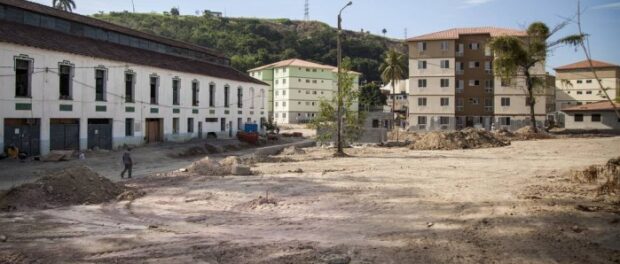
For the original article by Leonardo Sodré in Portuguese published by O Globo click here.
Six years after the storm, the calm is still far from arriving. Of the 3,200 families displaced in the tragedy that caused a number of landslides across the city of Niterói, 2,646 still haven’t received the homes promised by authorities at the time. Just 554 apartments have been delivered to residents of low-income neighborhoods and communities around Morro do Bumba in Niterói, in Greater Rio. Without the promised homes, hundreds of victims that lived in Fonseca, Caramujo, Baldeador, Morro do Estado, Morro do Céu, Morro do Castro, and Cubango still crowd the Civil Center of the Rio de Janeiro State Public Defenders’ Office, where over 800 cases brought forth by those who stopped receiving or never received social rent are in progress.
Of the 554 apartments delivered by the City through the Minha Casa Minha Vida federal housing program, by Brazilian federal savings bank Caixa Econômica, 180 were built in Viçoso Jardim in 2012. Another 374 families moved to the Zilda Arns 1 and 2 condominiums in Fonseca last year.
According to the Niterói city government, social rent in the amount of R$400 per month is currently being paid to 2,243 families, 403 fewer than the 2,646 who still have no homes. Part of this total still awaits delivery of the 1,240 units under construction in the area of the former Army Infantry Battalion (3rd IB) in Venda da Cruz. The works are behind schedule, since the initial expected delivery date was February.
General services assistant Vanildo Silva, 48, is at risk until today. His home, at Travessa São Luiz in Igrejinha, was condemned by the city’s Civil Defense Office after the rains in 2010.
“I had to leave the house with my wife, my sister, who has special needs, and my daughter who was 4 years old at the time. A friend of mine in Rio do Ouro took me in as a favor. I tried to register for social rent at the Social Assistance Reference Center in Badu but was never able to receive it. After two years, my only option was to return to my condemned home,” he explains, and continues to wait for a new assessment by the Civil Defense Office, requested three months ago by the courts and which as yet has not been carried out.
Day worker Lindomara Aparecida da Souza lived with her two children in Morro do Céu, in Caramujo. She also says she registered to receive social rent, but was unable to:
“My house fell down, and until now I have only received one payment, in September of last year. The rent at the house I’m currently living is many months late. I can’t pay it.”
Re-registration increases number of cases
According to the Public Defenders’ Office, the number of cases in the courts pleading payment of social rent has been increasing due to cuts to this benefit that began in December 2015, after the re-registration carried out by the city government in October.
“Every week we have three to four people complaining about the suspension in social rent payments. Some even say they have returned to homes damaged by the rains in 2010, even those in danger of collapsing, since they are no longer receiving the benefit,” says Christiane Byrro, advocate at the Civil and Consumer First Consultation Service Center in Niterói.
Around half of the 800 cases were judged in Itaboraí and São Gonçalo, among other cities. According to the Public Defenders’ Office, a number of families moved to neighboring cities after the tragedy. In proceedings in the 1st and 2nd civil courts of Niterói, which are covered by the Civil Center of the Public Defenders’ Office, there are around 400 of these cases. Public defender Marina Oliveira works on these cases and says that in some of them the courts decide in favor of cutting the benefit.
“We are appealing the suspension of social rent, but some of the judges believe the government cannot carry the financial burden forever. Meanwhile, the families have neither received their houses nor the benefit to help them support themselves,” she said.
The Niterói city government claims that social rent is paid by the state government. The State Secretariat of Social Assistance explained that it manages payment of the benefit, and that registration is the responsibility of the city. The city administration said that it received the registration list prepared in 2010 by the former city management, with 3,200 families. According to the city, the state government periodically requests that beneficiaries re-register themselves to avoid undue payments.
“The benefit is cancelled for those who do not re-register. Since 2010, a number of families have stopped receiving social rent–because they have moved, or they are no longer in a dangerous situation, they acquired another house with their own funds, their family income has increased, or because the benefit was being unduly paid,” said the city government in a statement, stressing that Vanildo and Lindomara are not registered. The city added that beneficiaries who stopped receiving the payments should call the Social Action Office or visit the office at Avenida Ernani do Amaral Peixoto 171, room 402, in downtown Niterói.
